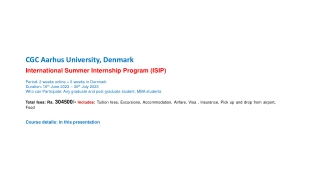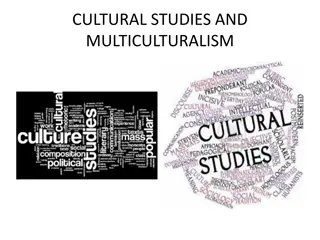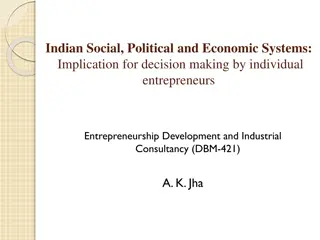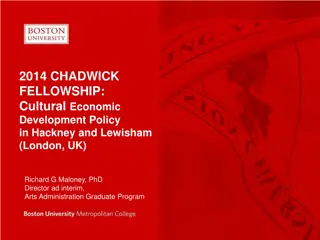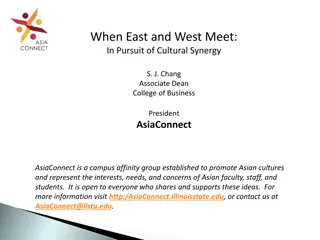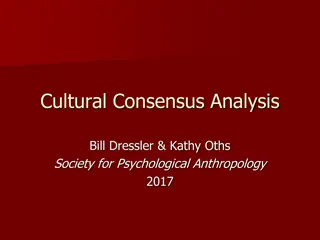The Impact of Cultural Factors on International Business
In this topic, you will learn about the influence of cultural dimensions on various aspects of international business such as contract negotiations, composition of the workforce, management styles, and their impact on organizational culture. Cultural factors play a significant role in shaping marketing strategies, brand names, and advertising approaches across different countries.
Download Presentation

Please find below an Image/Link to download the presentation.
The content on the website is provided AS IS for your information and personal use only. It may not be sold, licensed, or shared on other websites without obtaining consent from the author.If you encounter any issues during the download, it is possible that the publisher has removed the file from their server.
You are allowed to download the files provided on this website for personal or commercial use, subject to the condition that they are used lawfully. All files are the property of their respective owners.
The content on the website is provided AS IS for your information and personal use only. It may not be sold, licensed, or shared on other websites without obtaining consent from the author.
E N D
Presentation Transcript
D2 THEIMPACTOF CULTURAL FACTORS What are cultural dimensions? Do different countries have different cultures? THE IMPACT OF CULTURAL FACTORS
THEIMPACTOFCULTURALFACTORS In this topic you will learn about The impact of cultural factors on international business, e.g. contract negotiations, composition of the workforce, management style and its impact on the workforce and organisational culture, marketing strategies/brand names and advertising
CONTRACTNEGOTIATIONS Contract negotiations differ dependent on the culture of those taking part in negotiations Some negotiators are keen to build an ongoing relationship, whilst others simply want to complete the contract Some meetings will be formal e.g. the Japanese will use titles such as Mr. whilst Americans often like first name terms Time is more important to some cultures than others e.g. the Germans tend to be punctual and Americans want a quick deal
COMPOSITIONOFTHEWORKFORCE Global organisations will tend to have a diverse workforce This means that they will have to take into account a variety of needs and skills When operating in foreign markets, employing people with the required skills will be important For example, if targeting the Chinese market it would be useful to have employees with the ability to speak Mandarin
MANAGEMENTSTYLEANDITSIMPACTONTHE WORKFORCEANDORGANISATIONALCULTURE The overall way in which a business uses its resources to meet objectives This will have a direct impact upon the level of success in international markets Management will have to give authority to employees operating in overseas markets These employees might have greater negotiation skills due to a better understanding of local markets and cultures Therefore, the manager might maintain an overview rather than having direct input into day to day operations
MANAGEMENTSTYLEANDITSIMPACTONTHE WORKFORCEANDORGANISATIONALCULTURE The culture of a business affects the way in which it operates. This includes: Decision making Organisational structure Communication Leadership styles Attitude towards work What is corporate culture? Workforce performance
STRONGANDWEAKCULTURES A strong culture Staff respond positively to organisational values Shared sense of responsibility towards vision, mission and objectives Motivated and loyal workforce This is important when an organisation operates in different countries How does Zappos build a strong culture? A weak culture Little alignment with organisational values Employees have to be forced to perform duties Greater management control and supervision This can undermine a business operating in different countries
INFLUENCESONORGANISATIONALCULTURE Influences on organisational culture include: Mission statement and corporate objectives Personal attitudes, beliefs and priorities of the leaders Norms within society How does Richard Branson s leadership style influence culture at Virgin? Ownership and size of the organisation Geographical scope i.e. local, national or global Competitive environment
MANAGEMENTSTYLEANDITSIMPACTONTHE WORKFORCEANDORGANISATIONALCULTURE Personalities and beliefs of the founders and leaders Behaviours of founders and leaders on an ongoing basis Recruitment and training in line with culture Five elements of building a corporate culture. Day to day actions of all employees Reward systems Accepted norms in day to day attitudes and behaviours Reinforcing organisational culture in the different countries that it operates in can be a source of strength for the business
GLOBALMARKETINGSTRATEGIES A global marketing strategy is the adaptation of a marketing strategy to target all markets on a worldwide scale. This has evolved from national and international marketing where businesses market their products in the domestic market or in another country or group of countries. The traditional marketing mix or 4Ps is used with the aim of sending an identical message to all countries. This will have to be adapted e.g. in terms of language or religion but changes are kept to a minimum in each market.
GLOCALISATION Glocalisation is the adaptation of a global marketing strategy in order to meet the requirements of local geographic markets. The term is a mix of globalisation and localisation. A business is more likely to be successful if its global product can meet local requirements and fit in with the customs and religions of the geographic area. Examples of glocalisation. Although global companies would like to sell a standard product in a global market it requires significant investment in market research in order to understand local requirements. Often, it is the local people and practices that create the glocalisation rather than the business. In China, McDonald s is seen as a place for young couples to have their first date! How McDonalds conquered India.
MARKETINGSTRATEGIES/BRANDNAMES ANDADVERTISING The EPG model is a framework that can used to look at marketing approaches used by global firms. Ethnocentricity as a marketing approach is where the promotion of the product is undertaken based on the beliefs of the home nation of the business and is presented to the host nation as such. In a sense it is suggesting that the values of the host nation are superior to other nations. Therefore, products are marketed in foreign countries based on the perceived superiority of the host nation s values. To some extent, this approach ignores local customs, culture and religion. The home nation is where the business originated e.g. the USA. Decision making is centralised and key personnel from headquarters are sent to oversee marketing operations in other countries. This restricts promotion prospects for key marketing people who are not from the home nation and marketing ideas from the local area. The host nation is where the target market or subsidiary of the business is based e.g. India. This could be contentious if it offends the local population. However, often, the marketing is of an inoffensive nature in the first place.
MARKETINGSTRATEGIES/BRANDNAMES ANDADVERTISING Polycentricity as a marketing approach is where the promotion of the product is undertaken based on the beliefs of the nation in which the business is operating. In a sense it is the direct opposite of ethnocentrism, suggesting that the values of the nation being targeted are all important. Therefore, products are marketed in foreign countries based on the foreign nation s values, fully taking into account local customs, culture and religion. Decision making is decentralised and key personnel need to be recruited from the nation being targeted. This can create significant problems as recruitment might be difficult and there is a loss of control of marketing operations. Local knowledge can be used in the marketing. However, there might be a loss of sales as the product is no longer differentiated from other local competition.
MARKETINGSTRATEGIES/BRANDNAMES ANDADVERTISING Geocentricity as a marketing approach is where the promotion of the product is undertaken based on a global or worldly point of view. Therefore, it is not based on the perspective of either the home or host nation. Marketing is undertaking for the benefit of the business on a global basis. It does not matter where the headquarters or the subsidiary is located; they are a seamless entity, working as one rather than individually. What matters is that each element of the business helps in meeting its global objectives. Employees are selected based on ability rather than nationality. Therefore, products are marketed in foreign countries based on whatever is required for the business to succeed. This might entail marketing based on the home nation s values or based on the host nation s. This will depend upon the nation being targeted. This marketing approach mixes elements of ethnocentric with elements of polycentric.
PREPARINGFORASSESSMENT D.P7 Explore the cultural differences affecting international businesses D.M4 Analyse how cultural differences affect international businesses D.D3 Evaluate the impact of cultural differences on international business


